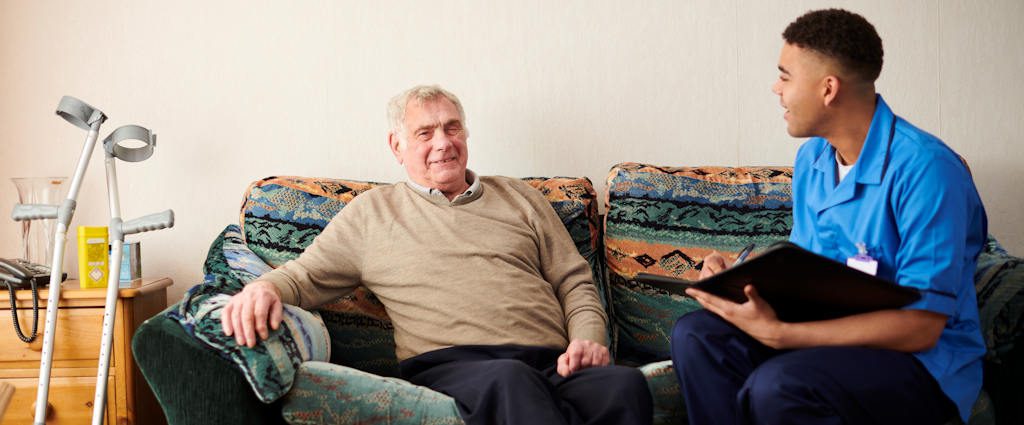
Developing safer health and care systems theme in the NIHR GM PSRC
Professor Caroline Sanders and Dr Tom Blakeman are leading the ‘Developing safer health and care systems’ theme at the National Institute for Health and Care Research Greater Manchester Patient Safety Research Collaboration (NIHR GM PSRC). Here, Tom introduces the new theme of work.
At the GM PSRC we are committed to looking at the way services are delivered to identify how to make them safer, particularly for those who are vulnerable. We’ve designed and developed the ‘Developing safer health and care systems’ theme with the input of patients, carers, and healthcare staff to help increase the ability of our research to narrow the gap in health inequalities.
Alternative care models
Alternative care models have become increasingly important in the delivery of health and social care services. Essentially, they are new ways of working that aim to deliver care in a more efficient and effective way.
NHS England has recognised the potential of alternative care models to improve the safety and wellbeing of patients. However, it has also identified the impact of these models on patient safety as a challenge faced by health and social care providers. Our research is aimed at addressing this challenge and we will focus on models of care for vulnerable and underserved patient groups across three priority areas:
- The impact of virtual wards on the safety of older people living with frailty
Our research on virtual wards for older people living with frailty has the potential to transform the way patients receive care. By identifying new models of care that prioritise their needs, we can help to reduce hospital admissions and improve safety outcomes for this vulnerable patient group. - Approaches to improve discharge care and follow up for people who have had a hospital admission affected by Acute Kidney Injury (AKI)
This research has the potential to reduce the risk of harm. By examining alternative service models that prioritise patient safety, we can ensure patients receive the support they need to recover and avoid any unnecessary readmissions. - Models of service delivery for people with Learning Disabilities and/or Autism
This area of our research aims to identify new models of care that prioritise the needs of patients and carers. This work has the potential to transform the way healthcare services are delivered for this underserved patient group and improve their overall quality of life.
Our approach
Our research programme is designed to ensure the voices of patients, carers, and healthcare staff are at the centre of our work.
In combination with this approach, our Systems Thinking perspective aims to enhance the ability of people, organisations, and systems to adapt and achieve safer and fairer care. This means that we are not only focused on identifying alternative service models, but also on understanding the broader systems in which they operate and how they can be improved to prioritise patient safety and wellbeing.
The research team
This theme is led by Professor Caroline Sanders and Dr Tom Blakeman at the University of Manchester. Our work around Learning Disability and/or Autism (LD&A) is led by Professor Umesh Chauhan:
- Caroline is Professor of Medical Sociology and leads on Public and Community Involvement and Engagement for the Manchester Academic Health Science Centre (MAHSC) and the NIHR Applied Research Collaboration Greater Manchester (ARC-GM). She leads qualitative and participatory research focused on patient and carer experiences of health and social care with a particular focus on marginalised and underserved groups.
- Tom leads our kidney health research. He is a GP and Clinical Senior Lecturer in Primary Care. He was a member of the NHS England Think Kidneys Programme Board (2014-2017) and was Royal College of General Practitioners’ (RCGP) Clinical Champion for Acute Kidney Injury (2017-2020) where he led the development of national guidance to improve post-discharge care following AKI. He is currently a member of the NHS England Renal Services Transformation programme. Aligned with the theme, he currently leads the NIHR funded study AsterAKI study
- Umesh is the Chair of the Society of Academic Primary Care (SAPC) LD&A Special Interest Group. Umesh also has considerable expertise around care for people with LD&A, which is particularly useful when implementing change to improve the safety and care for people with LD&A.
Our theme aligns with the NHS Long Term Plan of building ‘strong and effective integrated care systems across England’ that reduce health inequalities and improve safety outcomes. And, by involving patients, carers, and staff in our research, we can better understand their experiences and identify alternative service delivery models that prioritise their needs. Our goal is to build strong and effective integrated care systems that reduce health inequalities and improve safety outcomes for everyone.







0 Comments